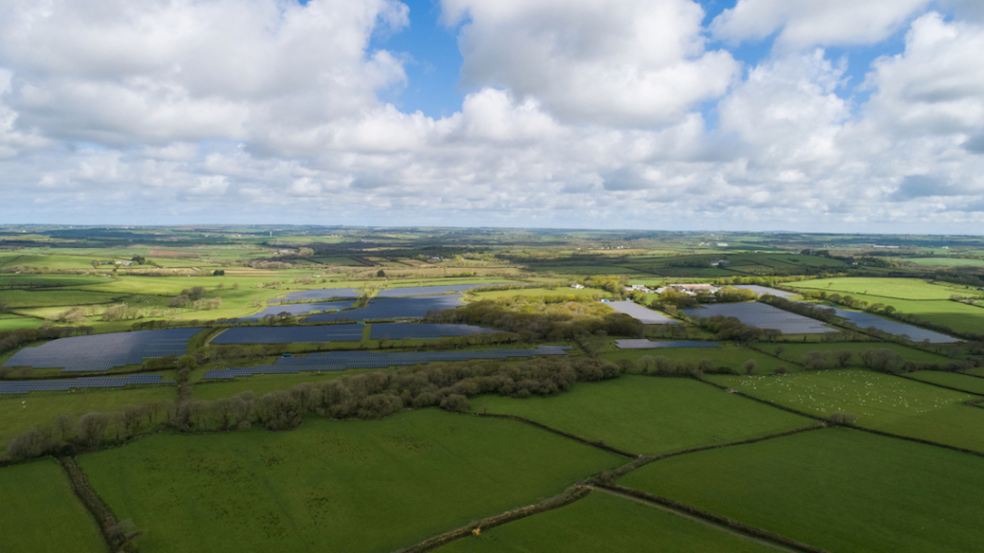
Why is government guidance not to develop solar on quality farmland being routinely ignored?
The Devon branch of the countryside charity CPRE is issuing a defiant call to arms - highlighting the blatant inconsistencies in the Planning system that are allowing solar development on thousands of acres of Best and Most Versatile (BMV) land that the Government says should be protected and prioritised for food production.
The small independent charity is ramping up its campaign to safeguard farmland for food after a High Court judge dismissed its legal challenge to overturn planning permission for a large solar installation on agricultural land in northwest Devon. Devon CPRE was disappointed to learn this week that its claim had been dismissed against Torridge District Council and solar developer Renewable Energy Systems Ltd over consent for the Derril Water site at Pyworthy.
Far from being discouraged by the judge’s decision, Devon CPRE will be writing to the new Secretary of State for Levelling Up, Housing and Communities, Greg Clark MP, and all local MPs pointing out that solar farms in Devon are repeatedly being permitted on land graded 3b or above, which government guidance says should only be used for solar installations in the most compelling circumstances.
The Agricultural Land Classification (ALC) identifies the best and most versatile agricultural land as a strategic resource to the nation. There are 5 grades of agricultural land, with 1 being the best and 5 being the poorest. BMV land is classified as 1, 2, 3a and 3b.
George Eustice MP, Secretary of State for Environment, Food & Rural Affairs, was recently questioned about the use of farmland for solar power in light of the surging number of projects approved and in the pipeline. He pointed to government guidance issued as far back as 2015 making it clear to local planning authorities that there should be “a strong presumption against solar farms on Best and Most Versatile land, and that is classified in law as grade 3b or above”.
As a prime example, on 26 July the planning application for Peradon Farm at Clyst Hydon (21/3120/MFUL) goes before East Devon District Council recommended for approval. 86% of the proposed development site is BMV land - grade 3a 17% and 3b 69%. The Planning Officer’s report to Committee shows that East Devon, like many other local authorities, disregards the fact that 3b land is classified in law as Best and Most Versatile land.
Devon CPRE Director Penny Mills says, “We are seeing thousands of acres of good quality farmland across Devon disappearing under solar, with local councils and energy companies riding roughshod over official planning advice in pursuit of the easiest and most profitable renewable option. We need to sow the seeds of anarchy to make this planning guidance law so that local authorities and developers can no longer simply disregard it, as they patently have done for years.
“We are urging our supporters to write to their local MP, demanding they take a stand on this issue. We need to insist that the government strengthens these guidelines and enshrines them in law to stop this senseless loss of our farmland, and industrialisation of the countryside before it is too late.”
She adds, “Food security is an even more pressing concern following the Russian invasion of Ukraine. Ministers must prevent good productive land from being taken out of agricultural use for solar farms or other purposes.”
Devon solar farms in planning, all using a very high % of BMV land:
- Marsh Green, East Devon. Planning application 22/0990/MFUL. Land grading 3a 8%, 3b 92% = 100% BMV land
- Coldharbour Farm, Ashreighney, Torridge. Planning application 1/0823/2021/FULM. Land grading 3b = 100% BMV land
- Horton, Whimple, East Devon. Planning application 22/0783/MFUL. Land grading 3a 13.8%, 3b 80.8% = 94.6% BMV land
- Peradon Farm, Clyst Hydon, East Devon. Planning application 21/3120/MFUL - goes to plans committee 26 July, recommended for approval. Land grading - 3a 17%, 3b 69% = 86% BMV land
Recently permitted Devon solar farms, all using a % of BMV land:
- Derril Water, Pyworthy, Torridge. Land grading 3a 39.8%, 3b & 4 55.1%. More than half of the land at Pyworthy is of a grade upon which the government says solar farms should not be built.
- Langford, Cullompton, Mid Devon - at appeal. The application document states: ‘The Agricultural Land Classification Report confirms that most fields are grade 3b.’ The developer inaccurately describes 3b land as moderate quality agricultural land, instead of Best & Most Versatile Land
- Webbery, Bideford, Torridge. Land grading 3b 27% = 27% BMV land
- Litchardon Cross, North Devon. Land grading - a mix of grades 3b & 4. The officer report states: ‘The land classification was grade 3b and 4 agricultural land (with 1 being excellent and 5 poor) and was therefore permitted for use as a solar farm. This confirms that North Devon District Council appears unaware that 3b land is BMV land.
The national countryside charity CPRE released new research about land use and food security on Wednesday, 20 July 2002. The report ‘Building on our food security’ concludes that almost 14,500 hectares of the country’s best agricultural land, which could grow at least 250,000 tonnes of vegetables a year based on typical yields, has been permanently lost to development since 2010. The South West has the best grazing land in the country.
CPRE is calling on the government to introduce a comprehensive, cross-departmental land use strategy. A planning framework of this sort would balance the often conflicting demands for farming, housing and energy needs on a finite amount of land - with a firm presumption against development on BMV land.













